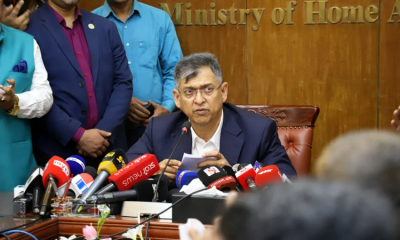Prime Minister Sheikh Hasina today called for developing a "resilient food system" globally by producing more food for growing population of the world as she placed a five-point recommendation at a summit here.
Joining the virtual "United Nations Food Systems Summit 2021", she simultaneously underscored the need for developing global coalitions and partnerships as well as reducing food waste through collaboration among countries.
"Access to adequate food is a basic right which is linked to the well-being and health of all citizens and the global system has social, economic, political and environmental implications," she said.
Speaking at the event in the High-Level Week of the 76th United Nations General Assembly (UNGA), the Bangladesh prime minister noted that food security is interconnected with climate change.
"By 2050, the global population is expected to be 10 billion. Therefore, it is imperative for us to grow more food for these additional people," she said, in her pre-recorded speech.
In her suggestions, Sheikh Hasina stressed research, investment, and advanced technology sharing for agricultural development to ensure food security.
The prime minister said increased funding needs for developing countries to achieve sustainable food system.
Sheikh Hasina also advocated for disbursing the committed fund to adapt to the climate-led extreme events, including sharing of technologies to achieve sustainable security.
She thanked the UN Secretary General for taking leadership in organizing this summit, saying, "The event is important for post-pandemic recovery and for achieving the sustainable development goals (SDGs) through resilient food approach."
The prime minister said the constitution of Bangladesh, framed under the guidance of Father of the Nation Bangabandhu Sheikh Mujibur Rahman, recognizes food and adequate nutrition as a fundamental right.
"We've integrated food system transformation in our national policies and action plans as an integrated tool to achieve Agenda, 2030," she said.
Sheikh Hasina said the Eighth Five-Year Plan, the National Agricultural Policy-2018, the National Food and Nutrition Security Policy-2020 and its Plan of Action (2021-2030) recognize the need for transformation of the country's food systems.
"As such, currently, the growth rate of our food production exceeds the rate of population growth ... we've become self-sufficient in food production from a food deficit country and have been working for long term food security," she added.
The premier, however, said greater frequency of extreme weather events due to climate change are affecting this momentum.
Sheikh Hasina said as a global leader in addressing the challenges of climate change, Bangladesh is also working on climate resilient agriculture and food system".
"In addition to food security, we intensified our efforts for ensuring food security and quality food for everyone," she noted.










-20260225072312.webp)







-20260224075258.webp)












-20260219054530.webp)
-20260218060047.jpeg)
